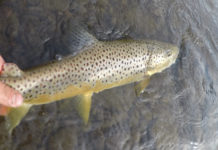By V. Paul Reynolds
As a fisherman, I have been blessed.
By V. Paul Reynolds
As a fisherman, I have been blessed. In more than 60 years of dedicated recreational angling, many memorable fishing adventures have come my way. Some stand out and always will.
On the Kenai River in Alaska, a 63-pound King salmon gave me a net-busting tussle. In Montana, a few lunker Cutthroats gave me a run for my money on the Yellowstone River, back in the days when these native Western trout used to migrate up river from Yellowstone Lake. And, of course, catching any-size Maine brookies on dries, when the Green Drakes are on, is always a take-away memory that endures.
There is one angling odyssey, however, that is above all others, a fishing experience that for me eclipses in a profound way the other outstanding fishing experiences. That is hooking, playing and landing an 18-pound fresh-from-the-sea Atlantic salmon. Nothing, from my experience, compares or comes close in the annals of fresh-water angling with a fly rod.
I have written about this angling adventure, more than once. You have to be there to fully appreciate the thrill. Picture it. A strong, silver-flashing solid fighter dancing across a foam-laden rushing river with your fly in its mouth, all connected to an arching rod and a singing reel that has begun to unspool, taking not only the fly line but most of the backing.
Yes, in the heydays of Atlantic salmon fishing on Canadian rivers, it was mostly available to those who could afford it or had connections. But there was, and still is accessible public water, and the determined angler of modest means could live the dream, if he had the patience.
Sad to say, those days seem to have faded into just an angling memory. The Atlantic salmon, for all intents and purposes, is now a Federally protected species. Those days are largely gone, probably never to return within my longevity window. But for the young, eager angler there is some hope. My old angler’s prayer is for the succeeding generation, an invocation to the Piscatorial Gods, that you one day get to enjoy an Atlantic salmon dancing on the terminal end of your 10-weight Sage fly rod.
To this end, there is some good news that contains a spark of hope.
A coalition comprising the Maine Department of Marine Resources, USFWS, the Penobscot Indian Nation and a commercial salmon-raising firm, Cook Aquaculture USA, has undertaken a novel approach to rearing adult Atlantic salmon and introducing them to the East Branch of the Penobscot River.
Approximately 5,000 adult fish will be transported from the net pens to target tributaries and the mainstem of the East Branch of the Penobscot River in the fall of 2021 or 2022, where they will find suitable habitat to naturally spawn. This will result in more spawning adults than have been present in the Penobscot River for decades.
Smolts raised from native broodstock by the US Fish and Wildlife Service at the Green Lake National Fish Hatchery in Ellsworth, Maine, and smolts captured in the wild by rotary screw traps will be used to stock the marine net pens in 2020, 2021, and 2022. Smolts will include only those from Penobscot River origin to ensure the genetic integrity of salmon released into the river.
What makes this so exciting? Because this new program will result in more spawning adults than have been present in the Penobscot River for decades. Adult salmon, unlike smolts, will stand a better chance of survival and returning to the river as spawners.
The goal, as always, is to build a healthy population of naturally reproducing Atlantic salmon. If this happens, and the fish is one day down listed by the Feds, anglers may once again enjoy the thrill of chasing the King of Fish.
The author is editor of the “Northwoods Sporting Journal.” He is also a Maine guide and host of a weekly radio program — “Maine Outdoors” — heard Sundays at 7 p.m. on “The Voice of Maine News – Talk Network.” He has authored three books; online purchase information is available at www.maineoutdoorpublications.com. or www.sportingjournal.com. Contact email — vpaulr@tds.net.
Credit: Source link






























